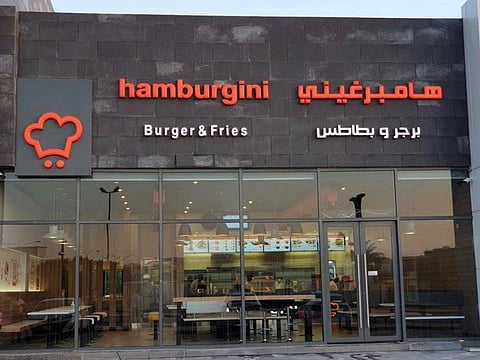Saudi burger chain Hamburgini files for bankruptcy after food poisoning scandal
Once a fast-food success story, Hamburgini shut down after outbreak eroded trust

Dubai: After more than a decade of rapid expansion, Hamburgini, one of Saudi Arabia’s most popular homegrown burger chains, has filed for bankruptcy following a food poisoning outbreak that devastated its reputation and finances.
The Commercial Court in Riyadh ordered the liquidation of Asasiyat Al Ghitha Trading Co., Hamburgini’s parent company, in August, according to Mubarak Al Anzi, a court-appointed bankruptcy trustee. Creditors were given 90 days to submit claims.
Founded in 2013 in Riyadh, Hamburgini quickly rose to prominence by marketing aggressively on social media and tailoring its brand to Saudi youth.
Between 2015 and 2019, the chain became one of the fastest-growing food brands in the Kingdom, expanding to 57 outlets, including nearly 30 in the capital, with additional locations in Jeddah, the Eastern Province, Qassim, and Hail.
In 2020, its then–chief executive, Nawaf Al Fawzan, boasted that Hamburgini was opening more restaurants than any other chain in Saudi Arabia and revealed plans to float a 20 percent stake on the country’s Nomu parallel market.
But that trajectory came to a sudden halt in 2024, when more than 70 people fell ill and one person died after eating at a Hamburgini branch in Riyadh.
Investigations by the Ministry of Municipalities and Housing and the Saudi Food and Drug Authority traced the outbreak to contaminated mayonnaise imported under the brand “Bon Tum.”
Tests revealed the presence of Clostridium botulinum, the bacterium that causes botulism, a rare but life-threatening illness.
Regulators quickly shut down Hamburgini’s Riyadh outlets, halted the distribution of the mayonnaise nationwide, and ordered the closure of the supplier’s factory.
Although the tainted product was traced back to the supplier, the damage to Hamburgini was immediate and severe.
Consumer trust evaporated, sales plunged, and regulatory closures compounded the chain’s financial problems.
Over the following months, the company shut branches, scaled back operations, and failed to recover revenues. Mounting debts and ongoing losses eventually forced it into liquidation proceedings.
The collapse puts an end for a brand once hailed as a Saudi entrepreneurial success story in the crowded fast-food market.
Sign up for the Daily Briefing
Get the latest news and updates straight to your inbox



![An aerial view shows Kingdom Tower in the Saudi capital Riyadh. [Illustrative image]](http://media.assettype.com/gulfnews%2Fimport%2F2020%2F05%2F26%2FSaudi-Riyadh_172500ec388_large.jpg?w=320&auto=format%2Ccompress&fit=max)